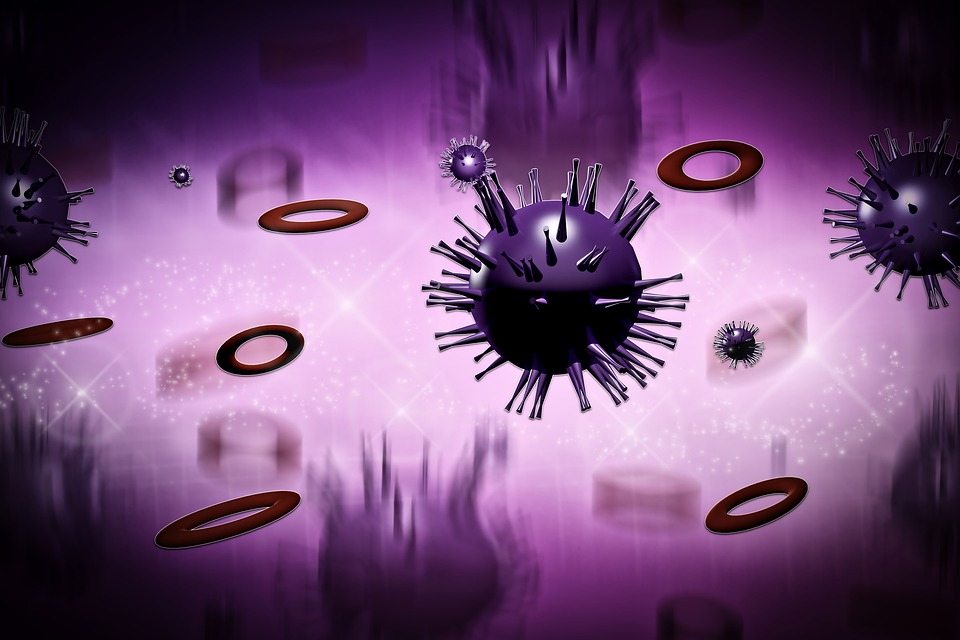
Herpes Virus
Considered a chronic viral STD, herpes is very common. There are currently 500 million people who have the virus globally. This virus is spread through skin-to-skin contact, with many people unaware that they have the virus. While the virus does have periods without symptoms, it is a chronic infection. Symptoms include painful, weeping sores that show around the genitals and anus. If you compare herpes vs HPV for example warts are a common symptom. However, HPV often presents with no symptoms at all!
Treatment includes antiviral medications that can reduce outbreaks and transmission. It’s always a good idea to talk to your doctor if you’re showing symptoms and are concerned about having the virus.
HIV
The human immunodeficiency virus attacks cells that help the body fight infection. It makes the person vulnerable to diseases and infections. It is spread through any bodily fluids of an HIV-positive person. Most commonly, this occurs during unprotected sex. Having sex with a condom or medications available through an online PrEP clinic can minimize this risk.
Left untreated, HIV can progress into AIDS. The body is unable to get rid of HIV; it’s a lifelong disease. There are antiretroviral therapies available to help prevent transmitting HIV to others and live healthy lives.
HPV
As a prevalent infection, the human papillomavirus affects 9 out of 10 sexually active people. For 90% of people, conditions will clear within two years of contracting the virus. HPV is not curable and can cause genital warts, oral cancer, and cervical cancer. HPV contains high-risk strains and low-risk strains, which influence the likelihood of these cancers progressing.
There are currently two vaccines to protect against the most common HPV strains (although over 180 strains exist). These vaccines are available to men and women under the age of 45. Most precancerous changes to the cervix can be treated before progressing into cancer. Genital warts can also be removed but do not remove the viral load of a person. Protected sex can minimize the transmission of HPV, but HPV is passed through skin-to-skin contact.
Hepatitis B
Currently, the leading cause of liver cancer, Hepatitis B, is incurable. This infection is vaccine-preventable and spreads through bodily fluids, blood, and semen. Hep B causes a severe liver infection, which can become chronic (lasting more than six months). Chronic hepatitis B increases your risk of liver failure, cirrhosis, or cancer.
Most adults will fully recover from hepatitis B, even when symptoms presenting are severe. Children and infants are more likely to develop an ongoing and chronic infection. Once you have the infection, there is no cure. If infected, taking proper precautions can help prevent the spread to others.
What About Hepatitis C?
Although it is uncommon, hepatitis C may be transmitted sexually. Sexually transmitted infections, numerous partners, and anal intercourse seem to enhance a person’s chance of contracting hepatitis C. MSM who are coinfected with HCV and HIV and have numerous sexual partners have been proven to spread hepatitis C. Hepatitis C has no vaccination. The most effective method to prevent hepatitis C is to avoid risky behaviors, including sharing needles or other injecting equipment. The CDC advises that all individuals (18 years and older) get one-time hepatitis C testing and that those with risk factors undergo ongoing testing. Currently there is no Hep C vaccine and it is considered incurable. The lack of transmissions by sexual intercourse deems it unworthy to be added to the list of incurable STDs.
How Can I Avoid Contracting STDs?
While condom use may help prevent the spread of a variety of STDs, no form of contraception is 100% safe. Occasionally, STDs may affect regions of the body that are not normally protected by a condom during sexual activity.
Prevention may also be challenging, since many individuals will exhibit no particular signs or symptoms of an STD while being infected. While complete abstinence from sexual activity is the only guaranteed method to avoid STDs, limiting sexual partners may significantly decrease the chance of infection. Early detection and identification of infections, as well as education about STDs and risk factors, may help prevent the spread of infection.
How Are Sexually Transmitted Diseases Diagnosed?
Numerous STDs are diagnosed based on the patient’s clinical history and distinctive physical findings. Herpes and syphilis are two infectious diseases that exhibit distinct signs and symptoms. Often, diagnosing an illness requires identifying the organism.
There are a variety of STD tests available that are based on the detection of the organism’s surface proteins or its genetic material. These techniques are more often employed to detect sexually transmitted illnesses than cultivating the bacterium in a petri dish.
Understanding the Lifelong Prognosis
While these STDs are incurable, having a happy and fulfilling life is possible. It’s important to remember that most STDs can resolve on their own (except for HIV and herpes), but even chronic conditions can be treated with antiviral medications. STD screening should be performed any time there is a new sexual partner or every three years in a monogamous relationship. If you notice any new or abnormal symptoms, contact your doctor for medical testing. These tests can include urine, blood, swab, or physical tests.
Testing for such conditions is painless. Many physicians will recommend abstaining from sexual encounters until the results come back or the treatment has finished. Always disclose any STDs with partners before engaging in sexual activity. As some STDs can be passed through skin-to-skin contact, intercourse isn’t required to contract some viruses.
Always talk to your doctor if you’re struggling with your diagnosis. There are many mental health programs for those struggling with self-esteem issues during the initial stages. Many positive individuals will go on to have positive relationships in the future. Counseling or therapy can help someone navigate through the process of diagnosis or treatment.
Comments
comments